When Melissa, the mom of Sasha and Lux, two special needs cats we’ve previously featured, shared a post about Mouse on Instagram, we were introduced to her for the first time. Initially, Melissa and Heidi, Mouse’s mom, thought that she had mucopolysaccharidosis (MPS), a rare and severe condition, similar to Sasha and Lux. To raise awareness about this group of inherited metabolic diseases, we have featured several cats with different types of mucopolysaccharidoses in the past. We approached Heidi, who is a veterinary student, to inquire if she would like to feature Mouse, but she wanted to wait until she received confirmation of the suspected diagnosis. Finally, after receiving the results, it was discovered that Mouse had mucolipidosis type II or I-cell disease, a type of mucolipidoses, which is also an inherited metabolic disease. We were eager for Heidi to share details about Mouse’s condition with us, as well as how she came to adopt this lovely special needs cat in April 2022. Despite her condition, Mouse is still a pretty typical cat in most ways, and we are grateful to Heidi for taking time out of her studies to tell us about her story.

Heidi discovered Mouse, a tiny kitten, along with her mother and two siblings in a yard in Northern California back in May 2021. Fortunately, Hopalong Animal Rescue of Marin Humane took her in and began bottle-feeding her as she was the smallest of the litter and kept getting pushed off the nipple. Mouse’s journey to adulthood is being documented on her Instagram page @lifewithmightymouse.
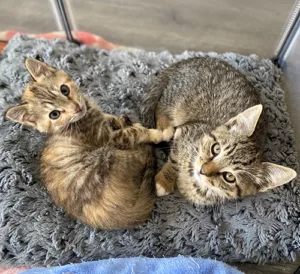
Mouse’s brothers did not have any developmental issues, but her foster noticed that at seven weeks old, she was not thriving. As a veterinary assistant at a clinic that provides low-cost medical services for Hopalong, I first saw Mouse when she came in limping on her right front leg. Although her vet couldn’t find anything wrong with her, we thought she looked small for her age and unusual. She was sent home with pain medication.
When Mouse returned a few weeks later for spaying, we realized that she was severely malnourished and bloated. Her mouth could only open a centimeter, making it difficult for her to eat. Despite having a healthy appetite, she could only lick the gravy from her wet food. Her veterinarians were concerned that she might have FIP or other serious congenital issues that could lead to euthanasia.
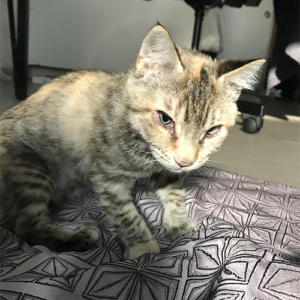
When I learned about Mouse’s condition, I decided to take her home as a foster with hospice care. My aim was to give her more time to determine the cause of her illness. Upon arriving at my place, Mouse quickly adjusted to her surroundings and played with her toys. She even had a bowel movement for the first time in three days! I knew from the moment I held her that she was overflowing with affection because she began licking me like a puppy. Despite her ragged appearance, Mouse displayed enthusiasm and a clear desire to survive while residing in my house.
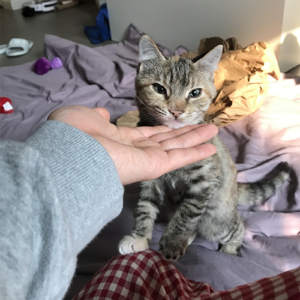
The image on @lifewithmightymouse’s Instagram account inspired me to use my veterinary knowledge to diagnose her condition and provide appropriate care. After being accepted into vet school, I officially adopted her and brought her to Cornell University where we currently reside. It took almost two years, but we finally received a diagnosis of mucolipidosis type II (I-cell disease). As for her name, I’m happy to share the story behind it if you’re interested.
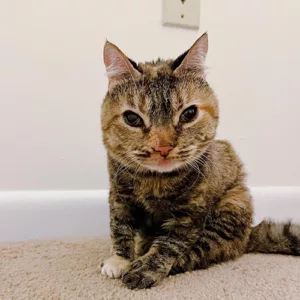
The name Mighty Mouse was actually given to her by the organization that fostered her. It’s inspired by a cartoon character from the 1940s. Despite her small size at only 4.7 pounds, she’s always been a fighter, hence the name. However, due to the length of the name, the owner usually calls her Mouse or Mousey. When asked why she decided to take in a cat with mucolipidosis type II, the owner explained that it was a case of “take her home or euthanize her.” She didn’t initially know what was wrong with her but felt compelled to give her a chance at life rather than letting her suffer a premature death with unanswered questions.
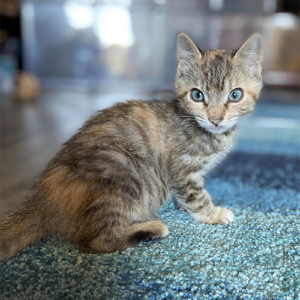
The Instagram account @lifewithmightymouse posted a picture of their pet, Mouse, who has been diagnosed with mucolipidosis type II (I-cell disease). As a rare disease that most veterinarians have never heard of, the owner feels qualified to care for Mouse. They are utilizing resources at Cornell and in contact with a researcher at the University of Pennsylvania who specializes in lysosomal storage diseases. Mouse’s genome is being sequenced, and the hope is to publish her case in the future. This congenital metabolic disease affects Mouse specifically by preventing adequate production of an enzyme needed for the digestion of GAG proteins, leading to osteoarthritis and blindness at a young age.
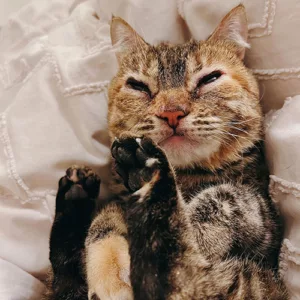
The adorable Mouse, as seen on @lifewithmightymouse Instagram account, has been dealing with stiffness in her body since she was only four months old. As she grew older, her mobility decreased, and she now has trouble jumping, climbing and walking smoothly. Her owner keeps everything within her reach to make things easier for her, including their own mattress. Mouse has a sensitive digestive system so her diet is tailored to cater to that as well. She also needs help with grooming and gets baths when needed. However, her biggest issue is arthritis, which requires daily medication to keep the pain in check. To further reduce inflammation in her joints, they use the Assisi Loop Lounge, an electromagnetic device that stimulates natural healing in the body without any invasive procedures.
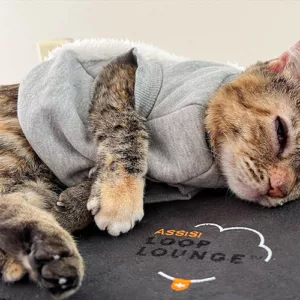
Mouse, a cat with arthritis, cannot digest joint supplements that include glucosamine or other GAG proteins due to her condition. To help slow down the progression of degenerative joint disease, her owner has started her on Flexadin UC-II, a supplement that tricks the body’s immune cells to stop attacking the collagen in her joints. In addition, Mouse receives daily massages and physical therapy exercises.
Owners of special needs pets, specifically cats with lysosomal storage disease, often face judgment from others about how they care for their pets. People may make snap judgments based on snippets that are shared on social media. The facial dysmorphia that is a hallmark sign of ML II and MPS cats can lead to misconceptions about their overall health. Despite this, these patients can do normal cat things, such as getting themselves into bags of cat food.
One of the biggest challenges of Mouse’s condition is uncertainty regarding her lifespan. Feline patients with ML-II typically live to only 7-8 months of age, but Mouse turns two years old in April. As with many owners of special needs pets, her owner experiences anxiety about her pet’s health whenever there is a change in behavior.
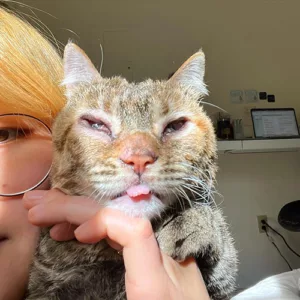
In all honesty, taking care of Mouse’s medical needs doesn’t pose any difficulty or challenge for me. I would gladly serve as her legs and eyes for as long as she wishes to stay with me. Additionally, I feel extremely fortunate to have access to exceptional veterinary care through Cornell University, where I am a first-year veterinary student. Mouse has already received treatment from the Neurology, Sports Medicine, and Ophthalmology departments, and we intend to take her to the Cardiology department as well. The unwavering support and eagerness shown by everyone involved in Mouse’s care fills my heart with warmth, and it’s gratifying to see such a strong community rallying behind her.
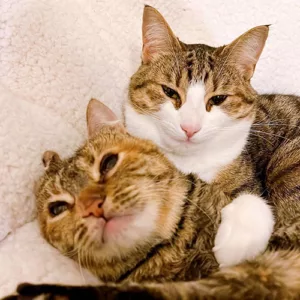
The author of the post expresses their fear of not knowing how long they will have with their special needs cat, Mouse. Despite this, they are grateful for every day spent with her and wouldn’t trade her for any other cat. When asked about what people should know about special needs cats, particularly those with ML II, the author discusses the issue of anticipatory grief and the anxiety that comes with knowing that their pet will eventually become sicker. This can often lead to mental breakdowns when thinking about the inevitable loss of their beloved pets. The author also highlights how being a caretaker for a sick pet is a draining experience that involves a lot of time and consideration that would not be necessary for “normal” pets. When asked about Mouse’s favorite activities, the author mentions that she loves cuddles and physical touch, and enjoys being around her owner while they do various activities such as knitting or cooking. The author also reminisces about how Mouse used to love going out onto their balcony to water plants with them.
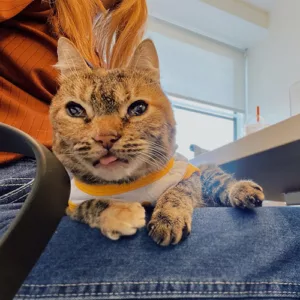
The adorable cat featured on @lifewithmightymouse Instagram account has a strong affinity towards food, especially liquid cat treats like Churu. Her love for them is so intense that she transforms into the Hulk and tries to grab the tube from her owner’s hand every time. When asked about the significance of Mouse in her life, her owner reveals that Mouse is her heart cat who brings out the best in her. Their bond is indescribable and it inspires her to become an exceptional veterinarian who can care for animals like Mouse.
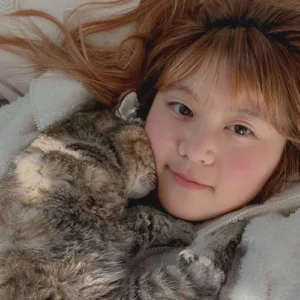
There are days when everything seems to be going wrong, but then I look at my furry friend and hold her tiny paw. It’s a reminder that life isn’t as complicated as we make it out to be. Being with her allows me to stay present in the moment and appreciate what really counts. I feel blessed to have her in my life.
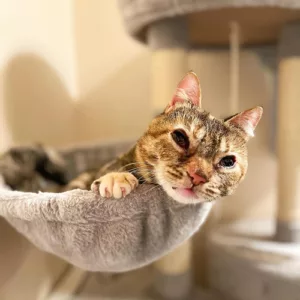
Discover more about this beautiful girl by following Mouse on Instagram. Check out her profile @lifewithmightymouse.




